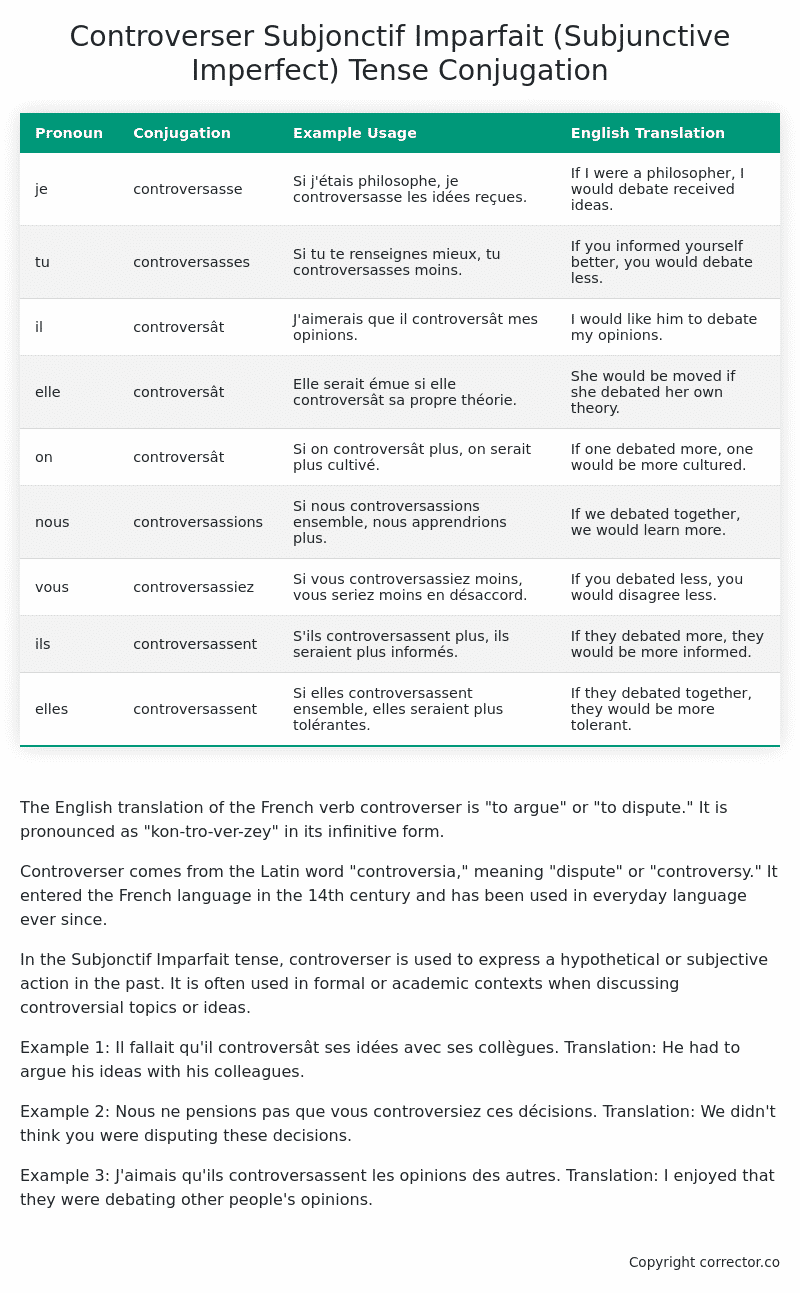Subjonctif Imparfait (Subjunctive Imperfect) Tense Conjugation of the French Verb controverser
Introduction to the verb controverser
The English translation of the French verb controverser is “to argue” or “to dispute.” It is pronounced as “kon-tro-ver-zey” in its infinitive form.
Controverser comes from the Latin word “controversia,” meaning “dispute” or “controversy.” It entered the French language in the 14th century and has been used in everyday language ever since.
In the Subjonctif Imparfait tense, controverser is used to express a hypothetical or subjective action in the past. It is often used in formal or academic contexts when discussing controversial topics or ideas.
Example 1: Il fallait qu’il controversât ses idées avec ses collègues.
Translation: He had to argue his ideas with his colleagues.
Example 2: Nous ne pensions pas que vous controversiez ces décisions.
Translation: We didn’t think you were disputing these decisions.
Example 3: J’aimais qu’ils controversassent les opinions des autres.
Translation: I enjoyed that they were debating other people’s opinions.
Table of the Subjonctif Imparfait (Subjunctive Imperfect) Tense Conjugation of controverser
| Pronoun | Conjugation | Example Usage | English Translation |
|---|---|---|---|
| je | controversasse | Si j’étais philosophe, je controversasse les idées reçues. | If I were a philosopher, I would debate received ideas. |
| tu | controversasses | Si tu te renseignes mieux, tu controversasses moins. | If you informed yourself better, you would debate less. |
| il | controversât | J’aimerais que il controversât mes opinions. | I would like him to debate my opinions. |
| elle | controversât | Elle serait émue si elle controversât sa propre théorie. | She would be moved if she debated her own theory. |
| on | controversât | Si on controversât plus, on serait plus cultivé. | If one debated more, one would be more cultured. |
| nous | controversassions | Si nous controversassions ensemble, nous apprendrions plus. | If we debated together, we would learn more. |
| vous | controversassiez | Si vous controversassiez moins, vous seriez moins en désaccord. | If you debated less, you would disagree less. |
| ils | controversassent | S’ils controversassent plus, ils seraient plus informés. | If they debated more, they would be more informed. |
| elles | controversassent | Si elles controversassent ensemble, elles seraient plus tolérantes. | If they debated together, they would be more tolerant. |
Other Conjugations for Controverser.
Le Present (Present Tense) Conjugation of the French Verb controverser
Imparfait (Imperfect) Tense Conjugation of the French Verb controverser
Passé Simple (Simple Past) Tense Conjugation of the French Verb controverser
Passé Composé (Present Perfect) Tense Conjugation of the French Verb controverser
Futur Simple (Simple Future) Tense Conjugation of the French Verb controverser
Futur Proche (Near Future) Tense Conjugation of the French Verb controverser
Plus-que-parfait (Pluperfect) Tense Conjugation of the French Verb controverser
Passé Antérieur (Past Anterior) Tense Conjugation of the French Verb controverser
Futur Antérieur (Future Anterior) Tense Conjugation of the French Verb controverser
Subjonctif Présent (Subjunctive Present) Tense Conjugation of the French Verb controverser
Subjonctif Passé (Subjunctive Past) Tense Conjugation of the French Verb controverser
Subjonctif Imparfait (Subjunctive Imperfect) Tense Conjugation of the French Verb controverser (this article)
Conditionnel Présent (Conditional Present) Tense Conjugation of the French Verb controverser
Conditionnel Passé (Conditional Past) Tense Conjugation of the French Verb controverser
L’impératif Présent (Imperative Present) Tense Conjugation of the French Verb controverser
L’infinitif Présent (Infinitive Present) Tense Conjugation of the French Verb controverser
Struggling with French verbs or the language in general? Why not use our free French Grammar Checker – no registration required!
Get a FREE Download Study Sheet of this Conjugation 🔥
Simply right click the image below, click “save image” and get your free reference for the controverser Subjonctif Imparfait tense conjugation!

Controverser – About the French Subjonctif Imparfait (Subjunctive Imperfect) Tense
Formation
Common Everyday Usage Patterns
Interactions with Other Tenses
Subjonctif Présent
Indicatif Passé Composé
Conditional
Conditional Perfect
Summary
I hope you enjoyed this article on the verb controverser. Still in a learning mood? Check out another TOTALLY random French verb conjugation!


